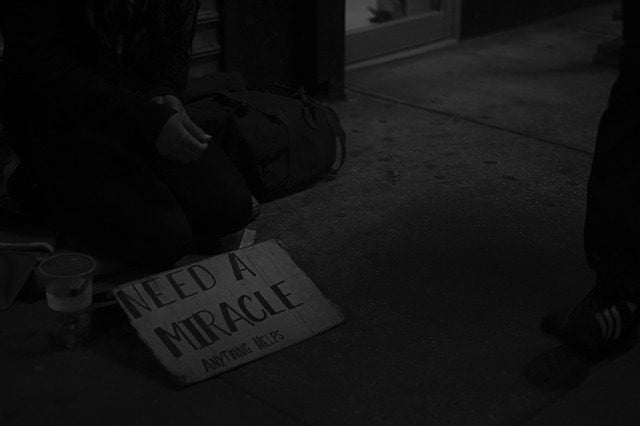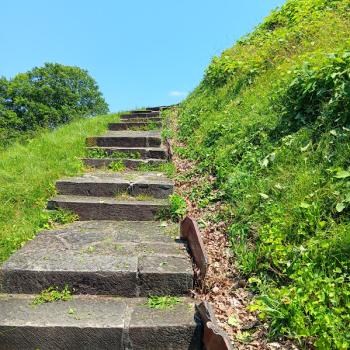
I keep thinking about that nonsense paragraph from Dreher that I tore apart yesterday. One phrase of his is rattling through my head: “the destructive culture of the poor.” He claims that no one would want to live next to Section Eight housing because of the “destructive culture of the poor.”
The destructive culture of the poor.
I mentioned yesterday that I think he’s dead wrong. There is no “culture of the poor.” Poor people are the least powerful class in the culture they occupy– poor Americans are the bottom rung of American culture, and so forth. Poor people have no power to hide or run from the vices and pitfalls of their culture, so the sins of a culture are manifested in their lives in a way that can’t be hidden. You can learn a lot about a nation by what they’ll tolerate and even defend doing to the poor.
What is the culture of destruction that Dreher mistakenly identified with poverty?
It’s our culture. It’s the culture we live in now, the culture so enamored of the spirit of the world. The world, meaning Creation, is good, but the spirit that fell from Heaven and is permitted to corrupt the world is our enemy. The Culture of Destruction is the enemy of Christianity.
The Christian worships Christ, recognizes that Christ is found hidden in her neighbor. A person a Christian calls a success is a saint– someone who answers the call of God and lives her vocation with her whole heart, on fire with love for God and manifesting that in love for neighbor.
The Culture of Destruction worships power– and today, in our society, the symbol of power is most often money. It’s considered a virtue to stockpile money, not money for any good purpose, but money for its own sake. It’s considered a virtue to show of how much money you’ve accumulated, not through giving it away but through spending it on luxuries. A person the Culture of Destruction calls a success is a rich person. Rich people may be praised for making nice large conspicuous donations to charity with their names on it, but only if they remain rich afterwards. If a rich person sold all she had, gave to the poor and took up an ascetic life, she’d be considered insane by the culture of destruction.
The Culture of Destruction asks, how can I become more powerful? Christianity asks, how can I shield the powerless?
The Culture of Destruction asks, how can I amass more possessions? Christianity asks, how can I empty myself to enrich my neighbor?
The Culture of Destruction asks, how can I be more ostentatious with my wealth? Christianity asks, how can I free myself of the desire for others’ admiration?
The Culture of Destruction asks, what’s in it for me? Christianity asks, what can I bring to you?
The Culture of Destruction devours those who are less powerful. Christians eat and drink Christ, and in turn pour themselves out for others.
The Culture of Destruction consumes and destroys. Christians build up and heal.
The Culture of Destruction loves rules and regulations that allow them to exert power over people. Christians are severe with themselves and merciful with others. They would always rather show clemency than exact punishment.
The Culture of Destruction divides people by race or class because it makes them easier to control. Christians regard everyone as sons and daughters of the same Father in Heaven.
The Culture of Destruction values people for their labor or their wealth. Christians value people because they are people.
The Culture of Destruction demands that anyone who can’t pay their own way should die. Poor people with no means to keep their utilities turned on should be punished with squalor and then have the squalor shunned by richer people, as Rod Dreher suggested we should with his comments on Section Eight housing. They should drink polluted river water and no one should pity them, as a shameless supposedly Catholic blogger once suggested. People who can’t afford a home should be turned out of their homes because homes are not for sheltering people but for making landlords and banks money. But once they’re out of their homes, they mustn’t live on the street either because streets are not for poor people to walk or live on; they are for looking aesthetic so people with money will enjoy shopping in establishments on those streets. So the culture of destruction which created homelessness enacts laws punishing the homeless for loitering or sleeping in public. They even try to penalize Christians for feeding, clothing and sheltering the homeless, because the homeless are waste products of the Culture of Destruction and have no value to it. And this is a true persecution, an injustice that the Christian should fight against.
The followers of Christ recognize that human beings are more important than the money they bring to the economy. Human beings deserve not only to live but to flourish, whether or not they can afford to pay for it. Houses are primarily for living in, not for enriching banks. Water is primarily for drinking and bathing, not for making money. People are not sources of capital but icons to be revered. The followers of Christ do not shelter themselves away from poverty. They embrace it. They see in the poor the suffering Christ. They actively seek this Christ and serve Him in any way they can.
The Culture of Destruction separates itself from people who are undesirable, but the Christian desires unity with all.
And this is why I’m suspicious of people who try to flee the world and form intentional communities apart from it. Sometimes, such a thing is a person’s vocation, and that’s wonderful. But I think the majority of Christians are supposed to remain in the world, servants to the least, signs of contradiction in defiance of the Culture of Destruction.
It’s not that the “destructive culture” Dreher observed doesn’t exist, after all. It’s just that, by trying to flee from unfortunate people, you wind up selling your soul to destruction.
(image via Pixabay)












